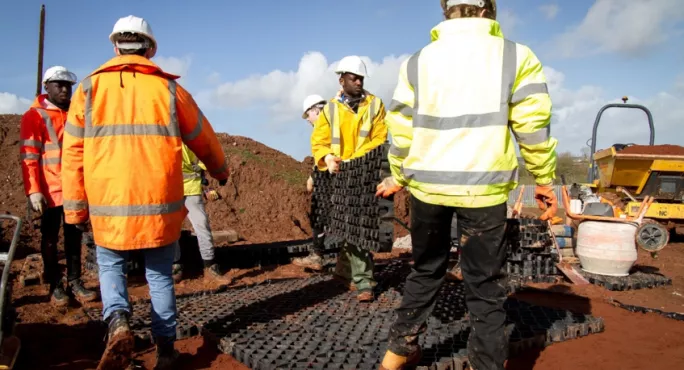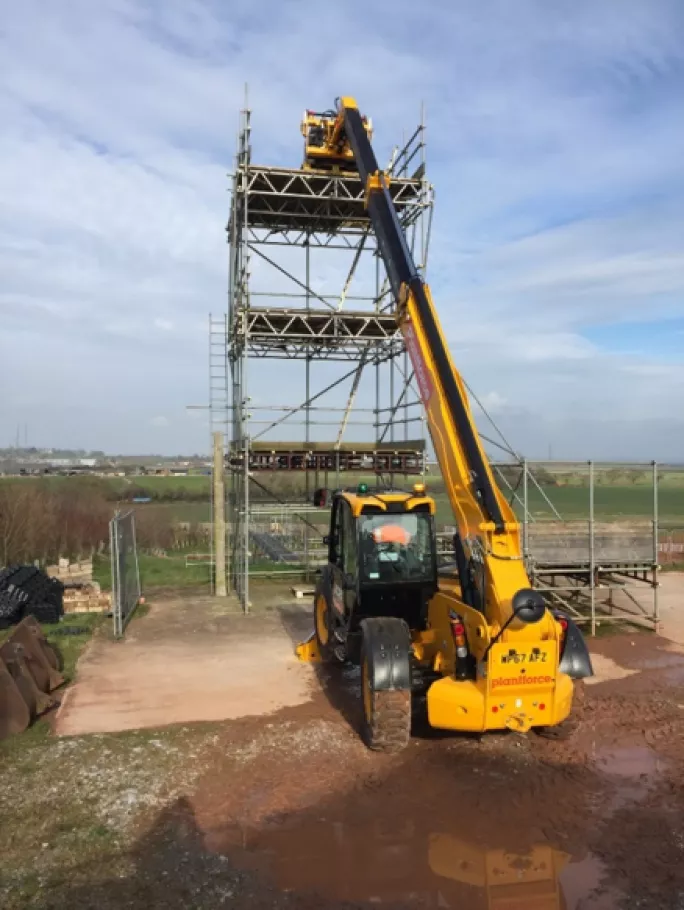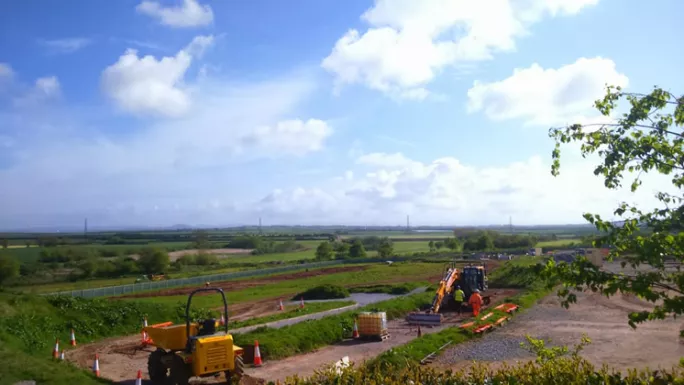- Home
- ‘We’re writing the skills blueprint for nuclear power’
‘We’re writing the skills blueprint for nuclear power’

For the first time in 20 years, a new nuclear reactor is set to be built in the UK.
Two new reactors are to be constructed at Hinkley Point C power station in Bridgwater, Somerset, and the project is estimated to cost around £20 billion. By 2025, it is expected to supply 13 per cent of the UK’s electricity.
It’s a huge undertaking - one which requires thousands of highly qualified, thoroughly trained staff for both the construction of the power station itself and then the running of it. Eventually there will be 4,000 workers on site, including 1,200 steel fixers.
Awards: Tes FE Awards 2020 open for entries
Background: Bridgwater and Taunton College wins at Tes FE Awards 2019
More: Want to become a nuclear scientist? Try an apprenticeship
Bridgwater and Taunton College (BTC) is training those staff. Its bespoke apprenticeship provision will provide the power station with a whole range of skilled workers - in particular, the steel fixers. The training programme has impressed many - including the Tes FE Awards judges. At the glittering ceremony earlier this year, the college won the award for apprenticeship programme of the year.
A broad church of further education
The college is set over three campuses: Bridgwater, Taunton and Cannington. It has around 20,000 students on roll, including 3,000 apprentices. There are also 3,400 students studying A levels and vocational courses, 800 higher education students, more than 5,000 distance learners - and then there are the students who come into the college for a morning or afternoon for short programmes on, for example, health and safety. It’s truly a broad church of education.
“One could think, ‘That’s quite challenging because you’re trying to do so much,’” says Andy Berry, CEO and principal of the college. “But if you’ve got a brilliant team of people, they’ve got a common belief and a common set of values, you can do a lot of things incredibly well. Whether that’s bespoke nuclear training, right the way through to working with plants in horticulture.”
The journey into nuclear training began in 2010 when representatives from EDF Energy asked for a meeting.
“I’m not sure they anticipated the response they got. What they found was one of the UK’s most responsive colleges. We were very able and very keen to strategically engage with them. When they said jump, we jumped,” says Berry.
The college has an excellent reputation for building links with industry. It operates the apprenticeship programme for Mulberry Design, is in talks to develop a pioneering nursing apprenticeship and already provides training for household names like Ford, the National Trust, KPMG, British Gymnastics and the Ministry of Defence.

Simon Brewer, head of infrastructure projects, says that the college, unashamedly, sees itself as the shop window looking into the community.
“We plug into the big opportunities that come through this town. You can look at that cynically as employers using a college, but we prefer to look at it as embracing those opportunities that employers bring in to the town,” he says.
“There are some stunning careers being forged over on HCP. They are being accessed by a huge amount of our community who would never otherwise have thought or had the opportunity to do so. We open that door.
Those careers aren’t just being sought out by sixth-form learners, but by mature students, too. At Hinkley Point C, stringent health and safety requirements mean that apprentices have to be at least 18 years-old. A lot of the apprentices are adults who have decided to change career path later on in life.
And for many, that path had led them to steel fixing. Steel fixers are absolutely crucial for any construction project: they position and secure steel reinforcing bars and mesh which then strengthen concrete on buildings.
Qualifications created at college
The average age of a steel worker in the UK is 56 - and before Hinkley Point C, no official qualifications existed for the profession, only “grandfather rights”, as Brewer puts it. On a nuclear-regulated construction site, these simply aren’t good enough - workers need to be able to demonstrate competency through a qualification. And so the college created one.
Working together with the contractors hired by EDF and awarding body NOCN, the college developed a level 2 apprenticeship in steel fixing.
The apprenticeship is like any other in some respects: students come into the college for a block of five weeks, before heading out to industry for eight to 10 weeks, on five rotations throughout the year.
But when students come into the college, they don’t just learn in classrooms. They learn practical skills on a replicated construction site on the Cannington campus.

“It’s important to us the activities our students do in the construction centre are equivalent to what they’ll be doing on HPC. We don’t have to do that, but in order to give these new entries into the construction sector credibility on site, we believe that they have to be working in a way and to a scale at college that prepare them for life on that site,” says Brewer.
As well as acquiring the skills and knowledge needed to succeed, apprentices are also taught the behaviours expected of them on a nuclear-regulated construction site. A whole range of attitudes are hammered home : from immediately questioning any inappropriate actions they may spot, to remembering to hold on to hand rails at all times.
Steel fixing is just one of many apprenticeships the college offers in relation to the power station. Students can follow pathways in formwork, digital engineering, carpentry and joinery, electrical installation, project control and metal fabricating, to name just a few. The college also offers apprenticeships in nuclear engineering, nuclear science and nuclear decommissioning, which will feed into HPC once it’s built.
By hook or crook
The programme isn’t without its challenges, however. Both Berry and Brewer say that the college’s place in the future of HPC can’t be guaranteed. Why not? Revenue funding is a huge issue, says Berry. The college has employed teams of staff to undertake research, innovation, development of qualification - but these investment costs aren’t funded.
The college can only make money once the qualifications are delivered. But even then, returning profit is a distant prospect, says Berry.
“There’s just no margin for profit. Steel fixing is a skills storage area, which means you have to pay a premium for the staff. It therefore doesn’t return on the investment you need to do to develop the qualification to standard.
“Quite literally in the nuclear sector, I’d argue that we’ve been writing the skills blueprint for the nuclear renaissance. We’re doing all of that work as an FE college and yet we can’t procure any funding to support it,” he says.
So how exactly is the college funding the programme? Berry says it subsidises it from A-level delivery, and other programmes that it offers: “You realise if you don’t do it, the college will miss out, the community will miss out. So you make the decision to try and do it.”

Brewer says it takes complete commitment to the cause.
“On a big project like HPC, it infiltrates so much of what we do here at the college. There’s a commitment that we’ve got to be doing something, that comes right from the board of governors down to the team in charge of the delivery. By hook or by crook you make it happen,” he says.
But they both openly admit that this whole-hearted commitment can be painful at times, and could eventually be unsustainable.
“We are a big organisation, we have a turnover of £50 million a year, so it’s just about doable,” says Berry. “But you get to a point, with another year of austerity, with another year of challenge, where you can’t keep doing it. One of our biggest single challenges is revenue support for the development and research.”
Funding pressures aside, the impact of the apprenticeship programme on both the college and wider construction community is impressive.
As Brewer says, the college is raising the bar on apprenticeships for niche construction areas. It is currently developing a level 3 apprenticeship for steel fixing - something that no other college in the country can claim.
“These apprenticeships are absolutely critical for the construction sector, particularly in the infrastructure areas that we’re working on,” he adds.
“Not many colleges do what we do because of the level of investment needed to do these niche apprentices and these niche projects and do them really well. We’re raising the bar on training for apprenticeships in these areas.
“When you are dealing with a large project with HPC, it’s not just large, it’s enormous and complex. This investment isn’t just in terms of funding - we invest in people, we invest in talent and focus them.”
The Tes FE Awards 2020 are open for entries. The deadline for entering is 1 November. For more information about the categories and how to enter, visit the awards website.
Keep reading for just £1 per month
You've reached your limit of free articles this month. Subscribe for £1 per month for three months and get:
- Unlimited access to all Tes magazine content
- Exclusive subscriber-only stories
- Award-winning email newsletters



